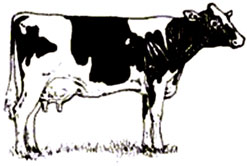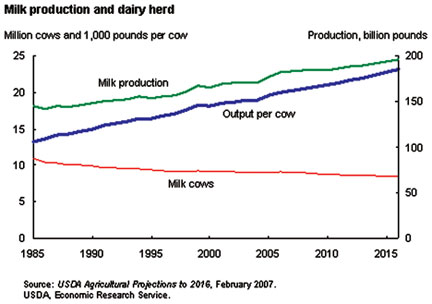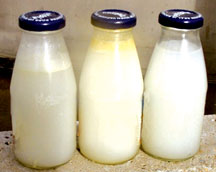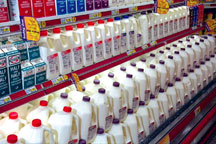Milk powder - storm in the tea cup
By Dhaneshi Yatawara
  Being an essentially required food by every person, irrespective of
age, gender or social status - milk, as a liquid food demands a high
value. Amidst such high consumption, price of milk powder is getting
higher and higher day by day, globally. We being Sri Lankans face this
challenge as it is milk powder is the commonest among us. For its
convenience and greater availability milk powder has become common milk
source in every household. Being an essentially required food by every person, irrespective of
age, gender or social status - milk, as a liquid food demands a high
value. Amidst such high consumption, price of milk powder is getting
higher and higher day by day, globally. We being Sri Lankans face this
challenge as it is milk powder is the commonest among us. For its
convenience and greater availability milk powder has become common milk
source in every household.
By end October the Government needs to renew the agreement for the
milk price between the importers and then in order to protect the
consumer, frankly the public of the country. Being in the 'essential'
basket and with a never ending demand, milk powder price seems to be
always in mid of a storm.
Milk powder comes under three basic categories - full cream, non fat
and infant milk. Categorised by the HS codes (a globally accepted
division system used during importation) milk powder brands with special
formula do not fall into any of those. It is how the system of
importation is processing in the global market, notwithstanding our
likes or dislikes.
 As lately agreed by the Government and the milk powder importers a
400 gram pack of full cream milk powder maximum price is Rs 195 and a 1
kilo pack maximum limit is Rs 460. The Government authorities have
requested the importers to make the 'welfare pack' readily available in
the market that would mostly benefit the low income groups of the
society. Previously these packs were available only in cooperative shops
and outlets of several welfare societies. The pack has the maximum price
level of 165 rupees. As lately agreed by the Government and the milk powder importers a
400 gram pack of full cream milk powder maximum price is Rs 195 and a 1
kilo pack maximum limit is Rs 460. The Government authorities have
requested the importers to make the 'welfare pack' readily available in
the market that would mostly benefit the low income groups of the
society. Previously these packs were available only in cooperative shops
and outlets of several welfare societies. The pack has the maximum price
level of 165 rupees.
Amidst all these agreements, regulations and many methods to keep the
prices low as possible, an average person finds it still expensive. Many
give various reasons and yet very few can at least reach the exact.
Under the section 14 of the Consumer Affairs Authority Act No. 09 of
2003, the Authority may enter into agreements with any manufacturers or
traders of goods provide for maximum price, the standard of any goods
manufactured, any condition required on the manufacture of any item. In
addition, section 18 of the Act states that no manufacturer or trader
shall increase the retail or wholesale price of any goods in the
essential basket except with the prior written approval of the Consumer
Affairs Authority.
Under the same section, part one, authorisation is given to the
Minister to order, in consultation with the Consumer Affairs Authority,
to prescribe goods or services as essential, where the Minister is of
the opinion that any goods or services is essential for the life of the
community. As per the CAA Act, a manufacturer or trader who seeks to
obtain the approval of the Authority should make an application and the
Authority shall after holding such inquiry may consider a reasonable
increase - it may be either the requested increment or any other
increase which the Authority may consider as reasonable. The Authority
is bound to respond with in thirty days from the applying.
Focusing attention on the consumers in the present context of the new
economic order and trade procedures the Consumers Affairs Authority (CAA)
was set up. The Consumer Affairs Authority Act was passed in the
Parliament on January 2003 which was enforced with the establishment of
the Consumers Affairs Authority. The CAA Act repeals the Consumer
Protection Act No.01 of 1979, Fair Trading Commission Act No. of 1987
and Control of Prices Act (cap 173).
Explaining the aim of establishing such Act the official Website of
the CAA states, "It safeguards the rights of not only the consumers but
also the trader who are subjected to injustice. Both the goods and
services come within the ambit of the Act."
According to experts of the field if an importer or a manufacturer
introduces a new packet in a new weight of an existing brand or a new
brand the company has the sole right to decide the price. The CAA Act
does not provide authority to intervene such instances at introductory
level. The Act provides authority only to revise a price of an already
existing brand.

Pricing factor
"Pricing is a very difficult factor to control in the present open
economy and according to the flow of the world market," a high official
of the Consumer Affairs Authority stated. Accordingly the CIF value of
1000 kilos of milk powder is US $ 5200 currently. When the taxes are
imposed, transportation costs and company margins added the cost for an
importer would be very high. Constant fluctuation of the dollar value
adds to intensify the situation.
Retail market
Many leading super market managers are currently facing a downturn in
milk powder supplies hence, unable to meet the demand. Thushan
Amarasooriya, Marketing Manager of the Cargills Super Market chain said
at present they are not receiving enough stocks from suppliers to meet
their demand especially, full cream milk. When we spoke to Deputy
General Manager of Laugfs Sunup super market chain P.T. Gunasinghe said
"we have not gone down in demand. Customers are purchasing milk powder
since it is an essential item to our day to day life. Yet we are facing
a reduction of supply in several top milk powder brands. Hence, meeting
the demand has become difficult."
Drought factor
Australia faced a severe drought during the last three to four years
that affected their dairy market significantly. The drought dried up the
grazing lands and as result cattle were deprived of their fodder. Added
to this, last winter season also affected the Australian grazing lands
thus damaging the dairy industry that was recovering from damages due to
the past drought.
Australian Continent itself is low in its water resources. Hence a
drought that persisted for three to four years has affected cattle
fodder in the grazing lands that consumes a lot of water.
Loss of fodder due to the drying up of grazing lands caused a price
hike in cattle feed. The farmers have been unable to cover their loss
through selling milk and other dairy products. Eventually prices of milk
and dairy product market have started to increase.
Australia exports 13% of their dairy products to the world market
whereas New Zealand exports 32%. The European Union contributes 34% and
the USA and Argentina contributes 6% and 4% respectively. Other
countries involved in this industry contribute only 11%.
Liquid milk, the alternative
 Do we have an alternative to all these issues? National Livestock
Development Board Chairman Dr. Chandrawansa Pathiraja sees the price
increase of powder milk as a positive step towards the manufacturing and
distribution of liquid milk. "Currently we are producing only 20% of the
liquid milk consumption demand and we are seeking all the ways and means
to increase," Dr. Pathiraja added stating that it would be a long
lasting solution to the high milk powder price. Do we have an alternative to all these issues? National Livestock
Development Board Chairman Dr. Chandrawansa Pathiraja sees the price
increase of powder milk as a positive step towards the manufacturing and
distribution of liquid milk. "Currently we are producing only 20% of the
liquid milk consumption demand and we are seeking all the ways and means
to increase," Dr. Pathiraja added stating that it would be a long
lasting solution to the high milk powder price.
"In the past Sri Lanka did not import milk powder at this rate. We
have to change our consumption patterns," he added. According to Dr.
Pathiraja the main problem the Sri Lankan liquid milk market facing is
the low production due to the lack of good quality dairy cows. "In Sri
Lanka there are 1.1 million neat cattle (local dairy cows) that has not
significantly increased during the last 30 years," he added. Most of
these animals are ending at slaughter houses at a very high price giving
a negative impact to the more important dairy industry.
"With the approval of the Government we are planning to start the
process of breeding good quality (high milk producing) dairy cows," he
said. The plan consists of long term steps and short term steps.
According to the Chairman to give the industry a boost it needs 60,000
dairy cattle immediately. "With the approval of the Cabinet of Ministers
we have started importing 15,000 dairy cattle in batches," Dr. Pathiraja
explained.
These imported animals will be handed over to 100,000 dairy farmers
established islandwide - these farmers have been identified as actively
involved in the industry. "Through the Gama Neguma programme we are
issuing these animals to these selected villagers," he added.
 |
According to reliable sources the
Sunday Observer learns that the Act is to be amended soon to
secure the rights of the public from unreasonable, unethical
marketing strategies. Last Thursday Oct. 4 the Cabinet
decided to amend the CAA Act to end the monopoly in the
wheat flour market. |
 |
|
